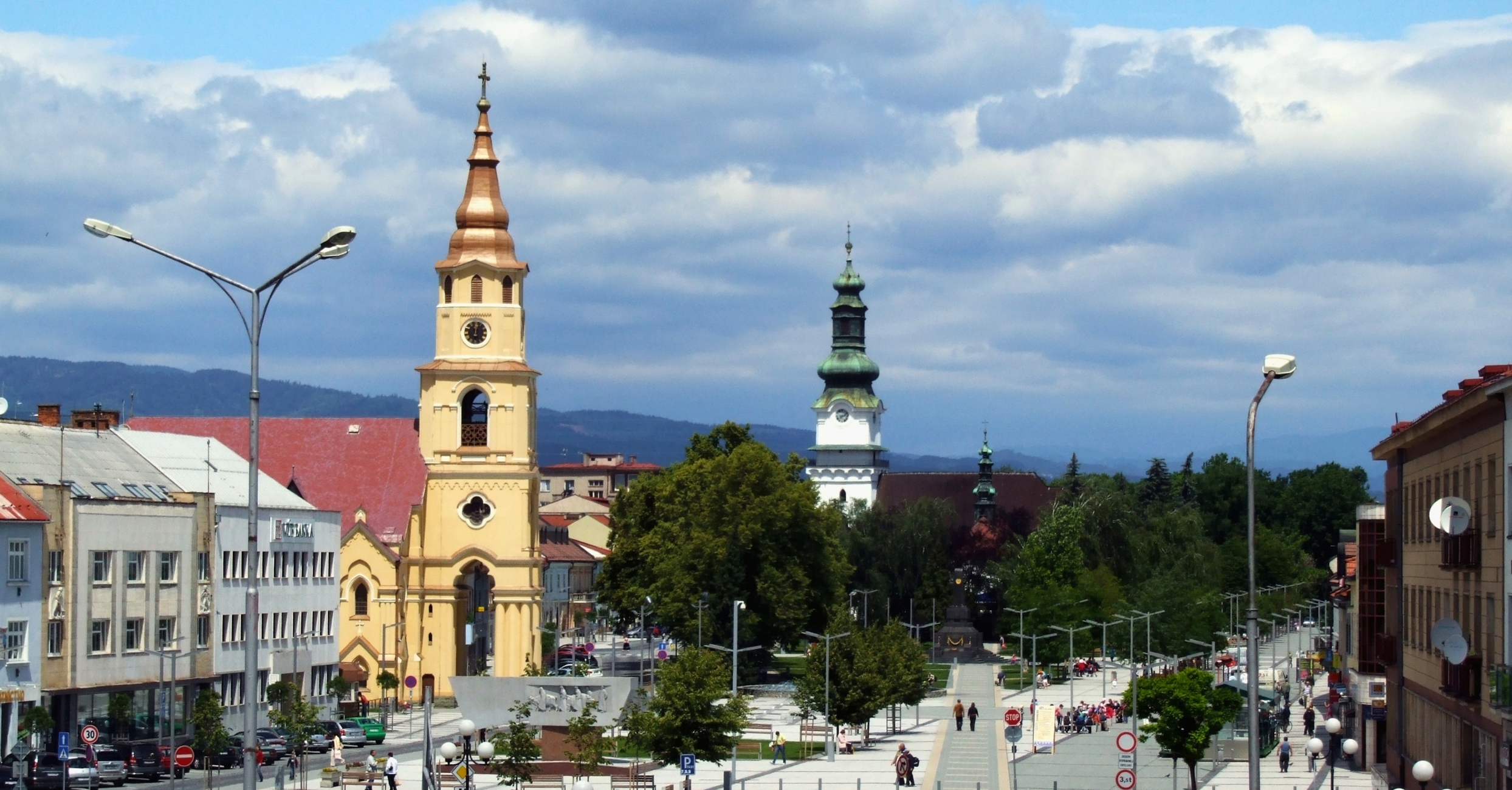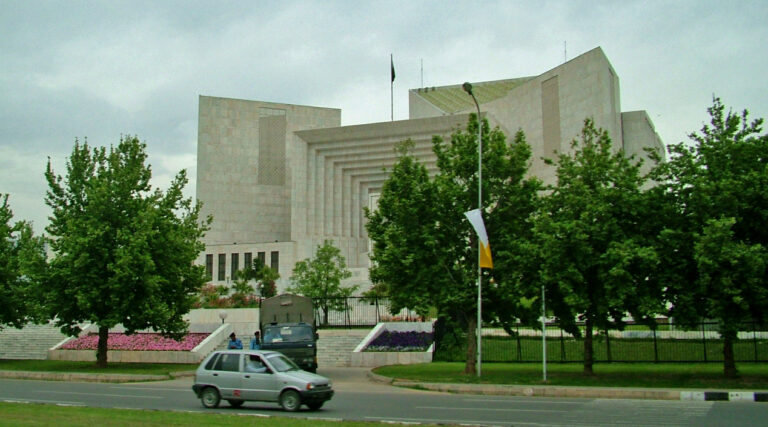
A Christian Constitutional Challenge – Hungary’s Fundamental Law
Stephen Dolan
Evangelical Church of the Holy Trinity and St. Elisabeth Church in Slovakia by Marcin Szala (CC BY-SA 4.0).
This article is part of our series on Transnational Christian Nationalism, and its impact on politics, the rule of law, and religious freedom. If you’d like to explore other articles in this series, click here.
Despite its relative size to the United States, Hungary and Hungarian politics are often called upon as an example of either the successful implementation of post liberal politics that focuses on the family and “Christian” or “traditional” values, or the tragic case of illiberal backsliding that has resulted in an EU member state becoming corrupted from within. In both cases, U.S. and Hungarian politics are more closely linked than ever before, and a lot is made of the “Christian” character of Hungarian politics. Viktor Orbán is unashamedly proud of the Christian character of his politics. For many of his critics, his Christianity is hollow, politically expedient and “Christianism” – a term used by Rogers Brubaker below to describe the political appropriation of Christianity for identitarian reasons. Critics point to cases like that of the Hungarian Evangelical Fellowship, who have been embattled with the Orbán-government for years, and are in danger of losing their abilities to operate schools and other social institutions. Orbán’s critics compare his rhetoric on Christianity with his actions that endanger the operations of Christian churches, especially those critical of him. In what follows, I want to encourage a more careful consideration of what we mean by Christian in our politics, taking Hungary as a case study. With one eye on the U.S. election, the ambiguity about the “Christian” nature of Hungarian politics should be a challenge for U.S. voters to go beyond mere labels and demand a more theologically nuanced debate about what a Christian ought to expect from politics, and how a Christian politician should behave.
Orbán and His Critics
Over the last decade, it has become increasingly more common for Hungarian politicians to discuss the Christian character of Hungary or its politics, following the example of the Fidesz Prime Minister Viktor Orbán. Since the migrant crisis that engulfed the Hungarian summer of 2015, the debate about Hungary’s future has been reframed in the language of defending the Christian values of Hungary in a way that was both new to the political rhetoric of the time, but also claimed a long, historic connection to the foundation of the nation over 1,000 years ago. While Orbán’s so-called Christian democracy had been building up steam for over 5 years by that point, the arrival of millions of migrants into Europe became framed as endangering or preserving Europe’s Christian character. However, Orbán and his government had already made significant changes domestically that caught the eye of critics as a dangerous creeping of Christian ideology into politics. For this essay, I will explore one of the first and most radical changes Orbán made in his domestic politics: the rewriting of Hungary’s Constitution in 2011.
The Christian Constitution
Within the American context, the near sacred nature of the United States Constitution as a document that upholds freedom and democracy in the nation is its political cornerstone. The same cannot be said of Hungary. After the end of the Soviet period, the first elected parliament attempted to rewrite the constitution but could not find agreement, so it made temporary alterations to the Soviet document to reflect the democratic changes in the nation and left it with a note to eventually change the Constitution when a consensus could be found. It took over 20 years for there to be a parliamentary consensus big enough to surpass the two-thirds majority requirement to change the Constitution. When Orbán’s Fidesz party won an unprecedented two-thirds parliamentary majority in 2010, his government soon began redrafting the Constitution, and in 2011 the New Constitution was voted into law on Easter Day. Opposition parties boycotted proceedings and, soon after its publication, scholars and critics were quick to decry its “Christian Nationalist” character.
The political and scholarly response to the new Constitution was emphatic. Thinkers like Renata Uitz and Sándor Radnoti contributions to the edited volume titled “Constitution for a Disunited Nation” highlight the heavy influence of historic narrative in the document, its focus on symbolic depictions of Hungary and that it now contains a “Christian-national, nationalistic ideology”. American scholars, such as Rogers Brubaker, make the case that, following upon the constitution changes of 2011, when Orbán references Christianity it is not any actual Christianity he is talking about, but a form of “Christianism”, which is a “secularized Christianity-as-culture”. Orbán continues to defend the authentically Christian nature of his politics and Constitution, and in 2019 at the Italian Arteju conference declared that the new Constitution should be understood as being deeply Christian.
“The foundation [of Christian democracy] is a new Christian constitution, which was adopted in 2011. We used our two-thirds parliamentary majority to write a new Christian constitution with two-thirds majority support. And in order for everyone to understand its essence we adopted this constitution at Easter.”
If everyone is to be believed, the 2011 Constitution is a Christian document through and through, and as such imposes a Christian metanarrative and ethics on all of Hungarian society. However, a careful reading of the Constitution makes these claims difficult to uphold.
The Constitution Itself
Despite the near unanimous consensus that the new Constitution is in some way Christian, it is hard to actually pinpoint what type of Christianity it actually speaks to. The document is widely read in two parts; the Preamble, which I contend establishes a vision of national identity for Hungary, and the articles and laws that help to flesh this identity out with an implied ethic. Much is made of the Preamble’s descriptions of Hungarian politics, culture, and history, and at times its claims intersect with some elements of Christian history or culture. The Preamble declares that “we are proud that our King Saint István built the Hungarian state on solid ground and made our country a part of Christian Europe one thousand years ago”, “we are proud of our forebears who fought for the survival, freedom and independence of our country,” and “we are proud that our people have over the centuries defended Europe in a series of struggles and enriched Europe’s common values with its talent and diligence.” It also states that Hungarians “honour the achievements of our historical constitution and we honour the Holy Crown, which embodies the constitutional continuity of Hungary’s statehood and the unity of the nation.” Here, in several ways ,the Constitution’s Preamble declares an affinity towards a certain version of Hungarian history, starting with a saintly king and a holy crown, as part of a wider European Christian project that needs to be preserved and defended throughout history.
However, the most explicit reference to Christianity appears when the Preamble declares that “We recognise the role of Christianity in preserving nationhood. We value the various religious traditions of our country.” This addition has sparked intense debate and criticism from scholars, primarily around what this declaration is to mean and how to understand it in relation to contemporary Hungary. For some scholars, this means an implicit association with Catholicism, but others see this as a further example of “Christianism” creating a divide between the Christian Hungarians and the non-Christian other.
Within the rest of the text, several changes or rewordings of existing laws have drawn the Christianist label. For example, Article II of the Constitution makes claims about the human dignity and foetal life.
“Human dignity shall be inviolable. Every human being shall have the right to life and human dignity; the life of the foetus shall be protected from the moment of conception.”
Article L expands the previous constitutional arrangements for marriage to state that “Hungary shall protect the institution of marriage as the union of a man and a woman established by voluntary decision, and the family as the basis of the nation’s survival [and] Hungary shall encourage the commitment to have children.” To round off, Article VIII states that
“Every person shall have the right to freedom of thought, conscience and religion. This right shall include the freedom to choose or change religion or any other persuasion, and the freedom for every person to proclaim, refrain from proclaiming, profess or teach his or her religion or any other persuasion by performing religious acts, ceremonies or in any other way, whether individually or jointly with others, in the public domain or in his or her private life. The State and Churches shall be separate. Churches shall be autonomous. The State shall cooperate with the Churches for community goals.”
For scholars, these changes are the sure signs of a Christian ethic having been implanted within the Constitution’s value system. None of these articles mention Christianity specifically; yet, for commentators, these are the sure signs of a Christian nationalism that has invaded Hungarian politics with Orbán leading the charge.
A Theological Reflection
It has never been more important for the wider public to be able to tell the difference between what is true and what is said to be true, or even worse, a lie. In the case of the Hungarian Constitution, both the critics and the supporters believe the document to be in some way Christian–either “Christianism” or the foundation of Christian democracy in Hungary. But the document is not Christian in the theological sense. The ethics it describes do not contain any reference to God (nor to Christianity for that matter) but instead just a list of stated principles, without a clear claim to the ultimate good that a Christian finds in God.
The Preamble may speak of Christian kings and crowns and history, but that does not make something Christian. The Hagia Sophia in Turkey was once a Christian cathedral but we would not consider it a Christian church any longer. What the Constitution shows and what this essay is challenging us is to consider, is what are the presumptions and biases that predispose us to associate Christianity with certain political actions or beliefs? When Orbán describes the Constitution as the foundation of Christian democracy in Hungary, what does he see in the document as actually Christian? Without reference to God as the ultimate good or the role of Christ in saving humanity from political society it is difficult to make the case that it is actually Christian. For its critics, reading articles and laws about foetal protection and marriage being between a man and a woman may have some parallels in Christian political theology or ethics, but without reference to God it is at best an homage to Christian theology.
Conclusion
The 2011 Constitution of Hungary is a cautionary tale about reading into a document what one expects to see if they think it is Christian. This ought to be a rallying cry for better theology from our politicians, but it should also be a wakeup call for our own theological literacy. Whether or not one is Christian, we should all be able to spot a genuinely Christian politics, grounded in a theology that can be interrogated and justified not merely stated. The Christianity in Orbán’s constitution is implied from all sides, but there is little actual Christian theology within the text. What can be made of the ways US politicians and campaigns utilize Christian images and rhetoric? Do we find a particular candidate to be consistent, theologically nuanced, and willing to set out their whole political vision with reference to the ultimate Good? Or are the politicians and candidates appropriating terminology and claiming Christianity while leaving the theology behind?
In order to effectively call attention to appropriations of Christianity we must first be literate in what can be considered Christian in the first place. The theologian is not simply an academic reserved for ivory towers but a valuable resource in combating political appropriation of the religious and the like. With November’s election looming, the claims to sacred nature of politics will be ramping up. For those faced with deciding between two radically different visions of what’s to come, being able to sort the wheat from the chaff is a theological skill that should be learned sooner rather than later. ♦

Stephen Dolan is associate lecturer in Catholic Social Thought at the University of St Mary’s Twickenham. His PhD analysed the role of Christianity in Hungarian Politics, and his current research explores claims to Christianity within politics, Catholic Political Theology and religion and nationalism.
Recommended Citation
Dolan, Stephen. “A Christian Constitutional Challenge – Hungary’s Fundamental Law.” Canopy Forum, November 4th, 2024. https://canopyforum.org/2024/11/04/a-christian-constitutional-challenge-hungarys-fundamental-law/.
Recent Posts










